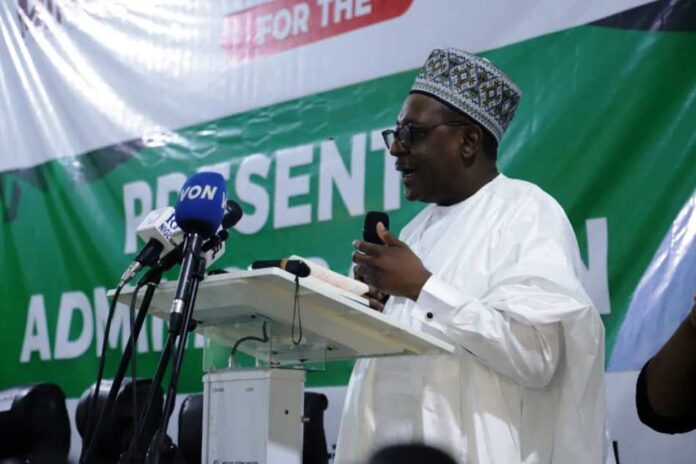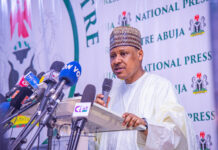Protocols.
Thank you for providing this platform for us to communicate with Nigerians about our activities over the past several months, under the leadership of President Bola Ahmed Tinubu, GCFR.
On behalf of the Honourable Minister of State for Health, the Permanent Secretary, along with the Director Generals, CEOs of agencies and regulatory bodies, and the CMDs of our hospitals, I am pleased to present this report.
People’s Voices.
Initially, when we started we embarked on a deliberative process to understand the expectations of Nigerians through the People’s Voices Survey. We examined the experiences and expectations of Nigerians, the burden of diseases and how it is evolving, what is working well and what is failing, the state of health infrastructure, human resources, financing, and the overall state of health of Nigeria.
We consulted with the States, development partners, civil society, and the private sector to articulate an agenda that aligns with the President’s overall reform agenda (The Renewed Hope Agenda). This agenda in health aims to save lives, reduce physical and financial pain, promote health, and ensure it is accessible to all Nigerians.
Since announcing the health agenda, we have been actively implementing it. Over the last several months, we have made considerable progress implementing the four pillars, which I will report on regarding our accomplishments, not just our future aspirations, to build human capital, improve health and well-being of our people to drive future prosperity in our country.
First Pillar: Improve the Governance of the Health Sector. While not as tangible, improving governance is crucial for advancing the health and welfare sector. It requires collaboration between the federal government, states, development partners, private sector and civil society.
We signed a strategic compact with all the 36 States of the Federation and FCT, endorsed by Mr. President, during the unveiling of the Health Sector Renewal Investment Initiative (SWAp) in December 2023. For the first time, our development partners signed a Compact governing our joint operations with them. This also included the private sector and civil society. At that event, our partners pledged $3 billion, reflecting their confidence in Mr. President’s agenda. Of this pledge we have signed $932 million grant with GFATM, $200 million with a philanthropic foundation and expecting additional $60 million in grants, $150 million announced by the Gavi Alliance, in addition to US$1 billion facility governed by MOU signed with Afreximbank to unlock the healthcare value chains. Additional resources are being mobilized.
We have begun to strengthen the regulatory framework within the sector. There are 16 professional regulatory bodies and other regulators of pharmaceuticals, such as NAFDAC, pharmaceutical council, medical laboratories, medical and dental council, nursing and midwifery council, and other aspects of the ministry’s stewardship role that we have repositioned and reinvigorated their leadership. We have also engaged constructively with health professional associations and unions to foster healthy work environment.
We have embarked on an ambitious digital transformation agenda to be on the path of electronic records, quality data for decision making and stronger data governance.
Additionally, we have set up a committee on standards for tertiary healthcare, which has been absent for eight years. This committee is tasked with defining the standards for tertiary facilities, in line with the National Health Act. The details of these standards are now accessible online.
We have also engaged multiple times with civil society, traditional leaders, religious leaders, and the media across the country, as a way to improve our orientation towards service to the Nigerian people, not narrow interests.
Second Pillar: Population Health Outcomes: Now, concerning the substantive second pillar—improving the population health outcomes of Nigerians—it is important to note that the federal government is only one part of this effort. Other sectors of the government also contribute significantly at the Federal level, as well as State Governments and intergovernmental entities.
At the federal Ministry of Health, we oversee 30 teaching hospitals, 22 federal medical centers, and 21 specialty hospitals, along with five core agencies, 16 regulatory bodies, 10 departments, and three special units.
At the primary health care level, through the National Primary Health Care Development Agency, in collaboration with the States, we outlined a plan to revive 8300 primary health care centers across the nation to make them fully functional and to expand and upgrade to 17,000 Primary Health Care Centers over the next 3-years.
The expansion is to refurbish these centers, equip them, making them fully functional to deliver essential services such as immunization, reproductive, maternal, newborn, and child health services, treatment of non-communicable diseases, and to facilitate referrals to secondary facilities. However, this ambitious plan requires the states to complement the efforts of the federal government.
Regarding the revitalization of primary health care, which aligns with the President’s directive, I am pleased to report that 260 billion Naira is already currently available at the state level for this purpose through IDA financing and the BHCPF. The revitalization of our primary health care centers hinges on the availability of resources and hence significant efforts made to mobilize and deploy the funds. We are now providing guidelines to assist the states in the implementation of the revitalization projects, ensuring that the resources are used prudently for their intended purposes.
We reviewed audits on the previous utilization of such financial resources and identified major gaps in several states. These issues were addressed through the National Economic Council and the Governors’ Forum. Our state governors have been instrumental in aligning with the President’s vision for increasing investments in the health sector. The transparency of disbursing the Primary Health Care Provision (BHCPF) funds was enhanced by conducting it publicly and establishing a hotline for Nigerians to report any misuse of resources. Oversight bodies such as the ICPC and EFCC are also encouraged to monitor to ensure that the implementation at the state level aligns with the intended objectives, particularly in terms of infrastructure and equipment and that the resources not misused.
In September, we announced the commitment to retrain 120,000 frontline health workers. This is part of a three-year agenda, and His Excellency, Mr. President, was recognized by the African Union as the African champion for human resources for health and community health delivery.
To fulfill this promise, we have reviewed and updated the training guidelines and curriculum for these frontline health workers. The revised guidelines have been printed, and the resources for training have been secured. The trainers have been trained in almost all States. Within the next one or two weeks, the training itself will commence across all states of the Federation. Over the next three years, at least 120,000 frontline health workers serving rural populations will be equipped with the necessary skills, supported by the infrastructure and equipment we will provide.
At least 1,400 Primary Health Care Centers are now equipped to provide skilled birth attendance, funded through the NPHCDA and the NHIA, covering the 8,300 facilities. More than 2,400 health workers, including nurses, doctors, and midwives, have been recruited to provide services to Nigerians, many of whom are women in rural areas delivering essential services.
In the area of vaccination, over 5 million Nigerian children have been vaccinated against diphtheria using pentavalent vaccine. More than 10 million Nigerian children received the tetanus and diphtheria vaccines. We are working hard to stop the circulating variant polio viruses showing up in Kano, Katsina, Sokoto, Zamfara and Kebbi States. We have delivered measles vaccines to more than 5 million children to protect them against measles, and 4.95 million girls 9-14 years in 15 States have received HPV vaccines to protect them against cervical cancer, representing 80% target, among the highest in the world. 6 million more are planned to receive the vaccines in the next phase for 21 states starting from May 27, 2024.
In terms of hospital equipment and infrastructure, the federal hospitals have successfully executed 201 specific infrastructure projects in the last 1 year. Additionally, 179 specific pieces of important medical equipment were procured by the federal government and distributed across the six geopolitical zones. In 33 of our federal tertiary hospitals, approximately 4.5 million Nigerians accessed outpatient health services, and 1.6 million had inpatient admissions. Showing that Nigerians are using the services provided by the Federal Government in those facilities, supported by an amazing army of health professionals.
We are witnessing substantial upgrade in healthcare infrastructure, a testament to the President’s leadership. Plans are underway for the groundbreaking ceremony of 10 healthcare infrastructure projects, through the NSIA, across the six geopolitical zones, including diagnostic centers and oncology centers. These developments are part of a broader initiative involving public-private partnerships. We are moving forward with a major PPP to get to the full business case stage for expanding infrastructure and equipping 6 teaching hospitals.
Addressing the critical issue of the health workforce, we have doubled the intake capacity of our educational institutions. Enrollment quotas for medical schools, nursing schools, and other health professional training institutions have increased significantly from 28,000 to 64,000 annually. Now the hard work of getting educational institutions to enhance infrastructure, teaching materials to ensure quality is not eroded by expanding the quantity. This is necessary given the shortage of health workforce.
We have also approved a managed migration policy for health and are looking at how best to address the excessive workload of medical providers, especially the medical doctors. In the last 7 months more than 100 young medical graduates secured residency positions in the US and we issued the certificates of need for them to be trained and return home, and changed the policy to include domestic as well as internationally trained medical graduates. We are working with Ministry of Labor as well as Salaries Incomes and Wages Commission to address long standing legacy issues of compensation and allowances which will take time and more patience from health workers.
All the above are on the supply side, but on the demand side, to expand affordability and financial protection, we are repositioning NHIA to expand insurance coverage for all Nigerians, especially the poor and vulnerable, not excluding civil servants who need deepened coverage. 1.8 million Nigerians are covered through the Vulnerable Groups Fund at NHIA. Reforms of the NHIA soon to be announced will address areas, including expanding private health insurance for informal sector, and strengthening the HMOs in tandem with SSHIAs at the States, repositioning NHIA as an effective and efficient regulator of the health insurance markets.
Unlocking the Healthcare Value Chain – The third pillar of our agenda is to unlock the healthcare value chain. The President has emphasized the importance of domesticating production capabilities, to retain economic value, and create jobs for our youth. In October, Mr. President approved the Presidential Initiative to Unlock the Healthcare Value Chain. Since then, we have made steady progress in policy changes to facilitate this goal.
The first policy measure, a draft Executive Order, has been produced and finalized. Once signed by the President, it will reduce barriers related to the import of raw materials and equipment for pharmaceuticals and medical devices. This policy change will enable Nigerians to produce essential items domestically, such as syringes, needles, generic pharmaceuticals, test kits, and long-lasting insecticide treated nets for malaria. We aim to shift the production of bed nets, currently manufactured abroad, to local production, fostering self-sufficiency and economic growth. One of the world’s largest treated bed nets manufacturer is exploring ways to establish a manufacturing plant in Nigeria to produce for Africa.
The forthcoming executive order, prepared in collaboration with the Attorney General, will pave the way for local manufacturing, job creation, and economic value retention within Nigeria. This initiative will shape the pharmaceutical market to support local industries.
The President’s effective promotion of Nigeria as a business-friendly environment has already attracted several international investors and foreign direct investments. Notably, a Brazilian entity has committed US$240 million to establish a generic manufacturing plant in Nigeria. Additionally, three entities are set to produce test kits, with one already operational in Lagos and two more on the way. This marks a significant shift from the past 25 years, where such kits were imported. The policy changes initiated by the President are now fostering domestic production and more are on the horizon.
Fourth pillar of our agenda focuses on health security. The new Director-General of the Center for Disease Control (NCDC) is playing a pivotal role in this area. The NCDC’s success lies in its ability to prevent diseases from becoming widespread, as evidenced by the containment of the Lassa outbreak and the rapid response to meningitis with the introduction of the pentavalent meningitis vaccine. The President has also approved additional resources for the NCDC to have contingent financing available, allowing for prompt action during health crises. The One Health Steering Committee comprising health, environment, agriculture and water ministries to coordinate the approach to preventing outbreaks is in full effect. We have submitted Nigeria’s application to the Pandemic Fund for increased financing.
Malaria remains a pressing issue in Nigeria. Recently, we initiated a major effort to reassess our approach to malaria, with the goal of accelerating progress towards its elimination, including better case management, affordable medicines, optimized delivery of tools, careful introduction of vaccines when available, community engagement and data systems.
Research and knowledge-building are crucial components of all our endeavors. We established NHRC and NHREC to strengthen ethics and governance in research and clinical trials. These committees are to ensure that all research conducted is not only intelligent but also ethical, protecting public interests, and adhering to proper standards.
At the regional level, the leadership and agenda set forth have led the Africa CDC to establish their regional headquarters for the Africa Center for Disease Control here in Abuja. The President has generously offered a building for this purpose, and you may have noticed the ACDC’s presence here. We have signed a Memorandum of Understanding (MOU) to formalize this arrangement.
Closing Remarks
There is a lot more to say, but let me end by appreciating the President’s leadership, close collaboration with all my Cabinet Colleagues, Chief Executives, and Civil Servants in the Ministry, Development Partners, Private Sector, Civil Society all





